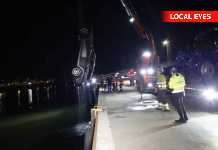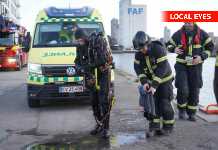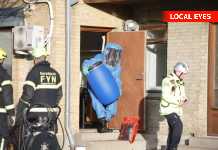Pressemeddelelse fra All In On Green
Once waste enters the oceans, removing it is extremely difficult. This is why a Danish is tackling the problem before it happens. The robot is installed at the river mouth in Aarhus, where the river flows into the harbour and wider sea. The robot collects the waste – things like plastic cups, facemasks and pizza boxes – before it pollutes the sea.At the same time, it allows boats and other marine vessels to pass by.
First aid for the marine environment
SeaProtectorOne could also limit sea pollution from rivers in at least 70 other cities in Europe. This potential has been shown by thorough studies of the cities’ local conditions carried out by the team that has developed SeaProtectorOne. Kim Gulvad Svendsen, COO Aarhus Municipality, readily shares his positive experience with this new weapon in the fight to prevent sea pollution.
“After the trial period, we were surprised at just how effective the robot was and by how much waste – especially plastic – it removed. This is plastic that will no longer end up in our marine environment. So the robot supports Aarhus Municipality’s sustainability efforts and above all, the UN’s global sustainable development goal no. 14: Life Below Water,” said .
Nine out of 10 pieces of plastic waste come from rivers
Every year, the amount of plastic waste that ends in the oceans is equivalent in weight to 57,000 blue whales. that floats around in the oceans, ends in the sea via river systems, according to the periodical Environmental Science.
“Once waste enters the sea it spreads quickly and is difficult to collect. Whereas the current in a river allows for the systematic filtering of waste in a limited area without disturbing fish or birds,” said
Mads Tranders Nielsen from is the man who invented .
“In an ideal world, every citizen everywhere would learn to always put waste into a waste bin. But we don’t live in an ideal world. The idea for the robot came to me when I saw huge amounts of waste floating in a river in Melbourne. SeaProtectorOne has now shown its worth, even in Aarhus, one of Europe’s greenest cities. So, I’m looking forward to bringing this technology to the rest of the world for the benefit of the marine environment, fish and birds,” said Mads Tranders Nielsen from All In On Green.
More sustainable city
After a successful one-year trial, Aarhus Municipality has now decided to lease SeaProtectorOne until February 2027. The municipality’s CIO, Bo Fristed, is pleased that Aarhus is the first city in the world to reap the marine environment benefits of SeaProtectorOne.
“We gladly make the city available for the test and development of new solutions, especially when it can help to solve the city’s challenges and meet its ambitions,” said , CIO at .
The solar-powered , is installed on a quay edge next to the mouth of the river in Aarhus. It can also be installed on a standalone foundation at the mouth of rivers, tributaries and streams.
Robot operation
The robot consists of a tower fitted on the land, to which a waste-trap arm is fitted. The waste-trap arm is equipped with a conveyor belt and a filter. The waste-trap arm automatically adjusts to the water level, ensuring the filter is always in the water, catching foreign objects in the water. The filter extends below the water to a depth of 30 cm, because most of the waste floating in the water is at this depth.
has integrated sensors, enabling it to automatically empty waste into a container on land when it is full. Emptying is also executed automatically once every 24 hours. During the emptying cycle, the filter is lifted, the waste-trap arm’s conveyor belt operates, and all of the waste is transported into the waste container.
The robot is equipped with thermal cameras which detect anyone on or in the water, such as surfers or swimmers. On detection, the robot swings its waste-trap arm out of the way, allowing free passage. The robot can be powered by solar cells or by connection to the mains electricity.
Kontakt:
Partner, All In On Green, Frank Rosenbjerg: Tel.: +45 27150805/E-mail: Frank@allinongreen.dk, www.allinongreen.dk
PR Consultant: Malene Grouleff: Tel.: +45 28915809/E-mail: malene@grouleff.it
Læs hele pressemeddelelsen på Via Ritzau her: https://via.ritzau.dk/pressemeddelelse/many-tonnes-of-waste-flow-into-the-sea-from-the-worlds-rivers-a-danish-robot-minimises-this-pollution?releaseId=13666233
** Ovenstående pressemeddelelse er videreformidlet af Ritzau på vegne af tredjepart. Ritzau er derfor ikke ansvarlig for indholdet **









